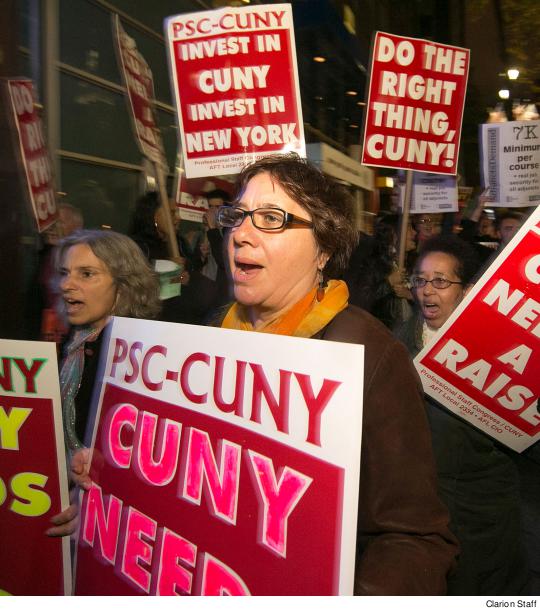On the streets in midtown Manhattan, in local campus protests, and at the negotiating table, PSC members have been pushing hard for a new collective bargaining agreement. The latest step in the union’s contract campaign is a petition drive that kicked off on November 17: it drew more than 1,500 signatures in the first 24 hours.
 |
The petition calls on Governor Andrew Cuomo and Mayor Bill de Blasio “to take immediate action to enable a fair settlement of the labor contract” at CUNY. “We have waited too long” for a new agreement, the petition says – and PSC members agree.
Four Years Is Enough
“Four years without a raise, that’s not right!” said Fred Lane, a financial aid officer at BMCC, at an October contract protest. “We can’t just sit there and not say anything like it’s OK. People have families to take care of – it’s not OK!” CUNY’s work is critical to New York City, he added: “We should get paid what we’re worth for the work we do.”
Lane was one of about 500 PSC members who joined the indoor rally and nighttime march on October 21, demanding progress. After gathering at the Community Church of New York for speeches and chants, they marched past Governor Cuomo’s office in Midtown and rallied again at CUNY central administration headquarters on 42nd Street. It was an energetic crowd, chanting “Low pay? No way!” and “No contract, no peace!” along the route. Drumming by PSC members and music from the Rude Mechanical Orchestra, a pro-union marching band, kept everyone’s feet moving.
Committed to CUNY
“We’re marching tonight to demand that CUNY management and State and City officials focus on putting a reasonable economic offer on the table,” PSC Secretary Arthurine DeSola declared.
“I’m very passionate about CUNY, I’m committed to CUNY and to its values,” Evelyn Lowmark, assistant director for administrative and support services at LaGuardia Community College, told Clarion. “I was a student at LaGuardia myself, so I know the passion that faculty, and staff, bring to their work,” Lowmark said. “CUNY is such a good value for students because the people who work here are so dedicated. If we invest in CUNY faculty and staff, we are also investing in our students.”
PSC members’ working conditions are also students’ learning conditions, union members noted. “The big thing at John Jay is teaching load. It’s a huge issue for us,” said Lyell Davies, an assistant professor of English – and when faculty members are stretched too thin, they can’t give students adequate individual attention. Allowing faculty to spend more time with students, Davies said, is a question of political will: “If [officials] want to spend the money, they can find it.”
“We need to come out in the streets,” said Sylvia González, an adjunct lecturer at LaGuardia for more than a decade, as the march reached CUNY Central. “We need a new agreement,” González said. “But not just a contract – a fair and just contract, one that responds to our needs.”
“I’m here because I believe in justice,” agreed Glenn Petersen, professor of anthropology and chair of the PSC chapter at Baruch. “It’s time for some!”
Ready to Testify
The week before, union members staged local actions across CUNY during “Press the Presidents Week” (see sidebar). They asked college presidents to advocate for a fair contract settlement, and emphasized how the continued lack of an agreement hurts CUNY as an institution. PSC leaders said the public needs to hear that case as well.
PSC President Barbara Bowen told Clarion that dozens of members were planning to testify at a public hearing of the Board of Trustees on November 24. “They will tell the truth about what unmanageable workloads mean for students, about how hard it is to recruit faculty at current salary levels, about the damage it does to students when their adjunct instructors don’t know if they will have a CUNY job the following semester,” she said.
Contract negotiations between the PSC and CUNY management are complex, Bowen noted in a November 17 letter to members, because “the PSC contract involves the politics and economics of the State as well as the City.” The path to an acceptable deal is not an easy one, she said: “It is time to turn up the heat. No contract, no peace.”
Forward
CUNY administrators “are trying to move things forward,” Mike Fabricant, the PSC’s treasurer, told the October 21 rally. “But we also know they don’t feel our urgency. They don’t feel the absence of four years of salary increases as we do. So we need to continue and escalate our campaign.”
Meanwhile active negotiations with management continue, with both formal bargaining sessions and working subcommittees meeting in November and December. “Even though there is no economic offer yet from CUNY, we are discussing both economic and non-economic demands to make as much progress as possible,” said First Vice President Steve London. “We need to be ready to move quickly once a good economic offer is presented.”
Achieving such an offer is the central focus of the union’s petition. “New York’s economic health has rebounded; there is no justification for an austerity contract. It is time to make the PSC contract a priority,” it says, and conclude an agreement “that respects the work we do.”

